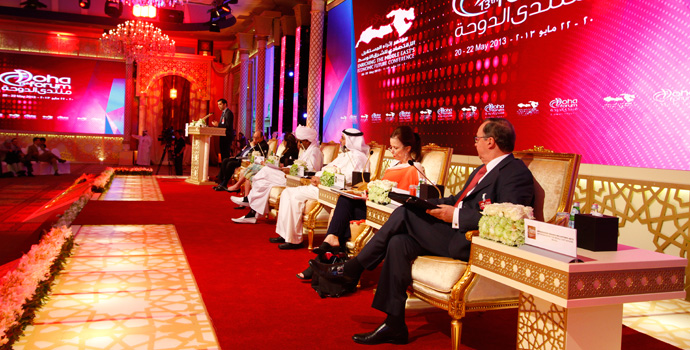


The international guests of honor this year will include some current Heads of State and Government. The Forum will also feature other distinguished opinion leaders, eminent political thinkers, decision – makers and members of parliament, renowned businessmen, academics, media figures and international organizations. These participants will contribute to a free, learned and stimulating debate on each of the many topics on the Forum's agenda, with a focus on the Arab Spring, the global financial and economic crisis, International Cooperation, Global Economy, Development, Human Rights and Digital Media.
The 13th Doha Forum will be held at the Ritz Carlton Hotel in the State of Qatar from 20-22 May, 2013. It will be attended by more than 600 participants representing over 80 countries and organizations.
Doha Forum Panel Examines Danger Of Arabs Losing Faith In Democratic Experiments

- ● Discussion on "Challenges Facing New Democracies in the Region" points to need for financial support for Arab countries in transition and fear of regression to dictatorship
Doha, 21 May 2013: A panel of experts discussing challenges facing the new Arab democracies said on Tuesday that financial and other help could be needed to stop some countries descending into ungovernability or even a return to the one-party systems brought down by the Arab Spring uprisings.
“The region is poised before a momentous transformation and the peril of failed revolution,” said Mona Yacoubian, Middle East Project Director at the Stimson Center, at the seminar on the second day of the Doha Forum in the Qatari capital. “It’s fair to say that time is not on the side of the Arab transitions. The instability that brought about the Arab transition has exacerbated the social and economic ills thatbrought young people to the streets in the first place.”
Echoing views expressed on the first day of the Forum on Monday, Yacoubian suggested an “Arab Marshall Plan” along the lines of the strategy for reconstructing Europe after the Second World War. “There’s a lot we can learn from the Marshall Plan as asuccessful blueprint for regional transition,” she said, describing the Arab world as one of the least internally integrated regions of the world.
“Regional economic development was in many ways one of the hallmarks of the Marshall Plan that focussed on trade relations across the continent and that same logic, I would argue, applies to the Arab world,” Yacoubian said. “The Maghreb (North African) countries have intra-regional trade of under 3 percent and I think that represents a vast untapped potential. In fact regional economic integration could be a real game changer. It would coalesce a vast consumer market of 300-350 million people. It would attract investment, and allowsmaller businesses in the region to expand... It would also promote stability across the region.”
But like other participants on Monday, she said the Gulf states would be the obvious candidates for putting up the cash for such a project. “The Marshall Plan was financed by massive flows of aid from the United States. In today’s world, we cannot expect that from the United States or Europe; the Gulf countries are in a position, however, to help – they command vast resources.”
Robin Wright, a scholar at the Woodrow Wilson International Center, agreed about the need for urgent action to ensure a democratic transition but said her fear was of the “Venezuelan model” of “democratic elections of strongmen to deal with critical problems”.
“The dirty little secret of the transitions is that corruption is deepening and spreading. A senior official in Libya said to me that in the Gaddafi era there was one Gaddafi, today there are 6.5 million,” she said. “There has been a proliferation of democracy beyond what is viable. In Libya there 200 seats in the Congress; 120 of those are allocated for individuals and over 3,000 ran for those; 80 seats are allocated to parties and over 130 parties ran for those seats. That is not viable in the long-term. There is a great danger of divisive forces – that (say) ‘I want to be leader, I want the privilege of power’ – that is going to backfire in the long-term.”
Abdul Aziz bin Othman Sager, the Saudi head of the Gulf Studies Center, agreed, saying there was a danger that the new post-Arab Spring elites would replicate the old regimes but in a democratic guise.
“The elite in power could try to introduce changes to the current democracy and change it gradually to totalitarian regimes. We need to remember that all the totalitarian regimes that were toppled in the region, like Ben Ali in Tunisia, Mubarak in Egypt, Gaddafi in Libya and Saleh in Yemen, had used democratic structures themselves, such as referendums, elections, parliaments.”
“This transformation was imposed by external pressures, it was the not the voluntary choice of the new leaders and powers like the Muslim Brotherhood (in Egypt). Western democracy is not their natural choice, in fact their ideology has always talked of Islamic democracy and not Western standard democracy,” Sager said.
He rejected the idea that Gulf states opposed the Arab uprisings, saying they had been quick to offer financial help to Egypt and recognize the changes that took place.
But Mustafa Osman Ismail, former foreign minister in Sudan’s Islamist government, said some Arab countries had an exaggerated fear of Islamist movements, such as the Brotherhood in Egypt or Ennahda in Tunisia. “Certain Arab states fear an Islamist tsunami in the region,” he said. “What is the future of the Arab Spring regimes? It will depend on their ability to manage the state, achieve political participation and democracy, economic development and social justice, security, minimum standard of services, saying the truth. I am positive and hope that all these challenges will be met.”
Ambassador CesarioMelantonioNeto, Brazil’s Representative for Middle East Affairs, also sounded a positive note, saying people needed to be patient.
“Transition takes time. We had many dictatorships in South America. In Brazil it took us 3 years to draft the constitution from 1985-88, and it took ten years from 1985-95 to create a new ministry of defence with the military under civilian control of the state,” he said. “So what we need to do is give more chance to democracy and be more patient, even if there are huge economic and political challenges in the Arab world.”
- ● Mona Yacoubian calls for an Arab "Marshall Plan" funded by Gulf states to save the Arab Spring
- ● Abdul Aziz Sager says there is a danger Islamist governments will replicate the old regimes
- ● Brazilian official, former Sudanese FM say new governments need time to prove themselves